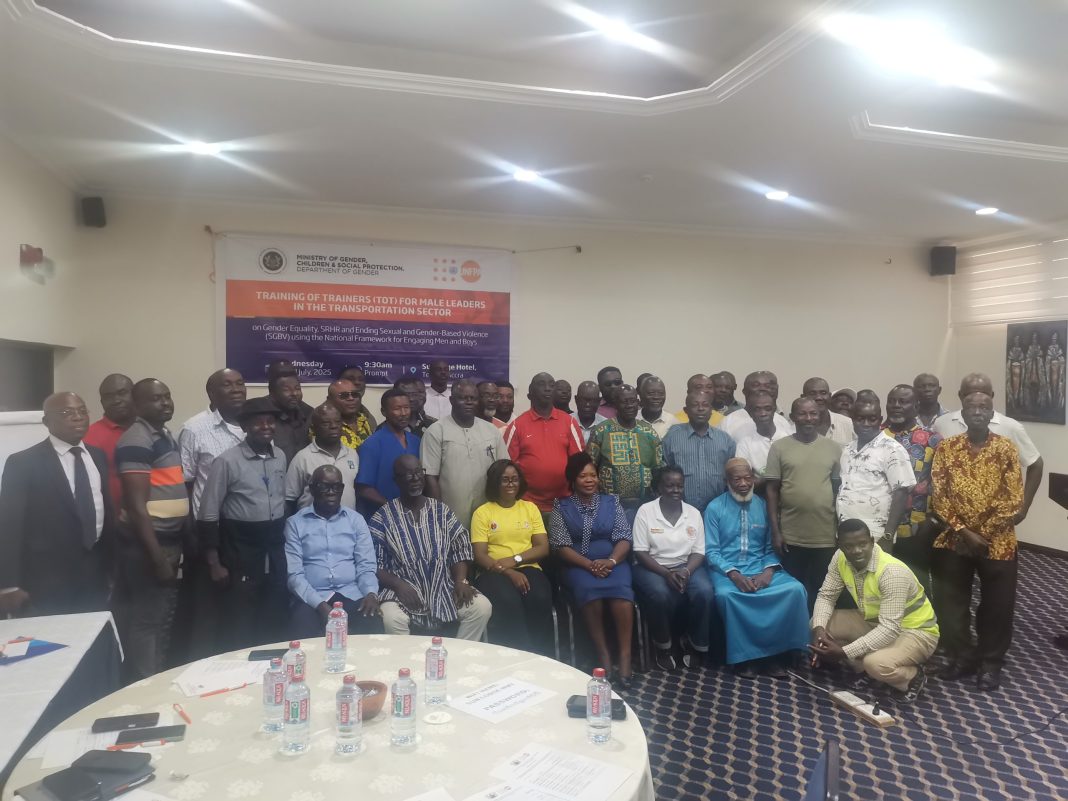By Priscilla Oye Ofori
Accra, July 23, GNA – The Minister of Gender, Children and Social Protection, Dr Agnes Naa Momo Lartey, has called on transport leaders to champion gender equality within their sector and communities.
She said transport leaders were key influencers with the capacity to effect meaningful change in households and workplaces.
The Minister made the call in a speech read on her behalf at a Training of Trainers session in Accra on Wednesday.
The training, convened by the Department of Gender with support from the United Nations Population Fund (UNFPA), brought together male representatives from various transport unions.
It focused on gender equality, sexual and reproductive health rights (SRHR), and efforts to end sexual and gender-based violence (SGBV) in the transport sector.
Dr Lartey stated that leadership and support from transport union members presented an opportunity to shift attitudes and challenge harmful dominant social norms and ideas about gender equality, as well as the patriarchal beliefs and structures driving inequality between men and women.


“As transport unions members and drivers, you have a vital role to play in promoting respect and safety for all and this training marks a critical step forward towards fostering a gender-responsive transport sector in Ghana,” she said.
The Minister noted that gender equality was fundamental to building a just society where individuals could thrive regardless of gender or intersectionality.
“We want a Ghana where the right, responsibilities and opportunities of individuals will not depend on whether they are males or females or other intersectionalities,” she said.
“Gender equality involves not only protecting women’s rights but also creating a fair and equitable world for all. It is about ensuring that everyone, regardless of gender, can contribute meaningfully to society, follow their dreams and live in a society free of violence and discrimination,” she added.
While acknowledging Government’s progress, Dr Lartey pointed out persistent disparities in the socio-economic participation of women and girls, compounded by structural and cultural barriers such as patriarchy and limited access to resources.
“These challenges are often compounded in rural and underserved urban communities where socio-cultural norms are more rigid, and information and services are less accessible,” she said.
She added that the Ministry had launched several initiatives to actively involve men and boys in gender advocacy efforts and, with UNFPA’s support, developed a National Framework and Toolkit for Engaging Men and Boys on ending SGBV.
Dr Emmily Naphambo, UNFPA Deputy Representative to Ghana, said in a statement read on his behalf that engaging men and boys was vital to tackling issues such as SGBV, SRHR and equitable access to opportunities.
“By working together to challenge the status quo, we can create safer, more inclusive workplaces where everyone, regardless of gender, can thrive,” he said.
Dr Naphambo said the workshop equipped participants with the tools to lead by example, promote respectful practices, dismantle stereotypes, and foster inclusive work cultures.


Mr. Olympio Peku, Vice Chairman of Tudu Welfare, Ghana Road Transport Union (GPRTU), pledged to help union members benefit from the training and support change in the sector.
Mr. Famous Abotsi, Deputy Advisor of the Commercial National Motor Riders Union, Greater Accra Region, encouraged women to pursue careers in male-dominated industries with confidence and determination.
GNA
Edited by Kenneth Sackey
